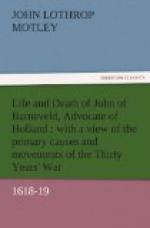In regard to the Synod, Barneveld justified his course by a simple reference to the 13th Article of the Union. Words could not more plainly prohibit the interference by the States-General with the religious affairs of any one of the Provinces than had been done by that celebrated clause. In 1583 there had been an attempt made to amend that article by insertion of a pledge to maintain the Evangelical, Reformed, religion solely, but it was never carried out. He disdained to argue so self-evident a truth, that a confederacy which had admitted and constantly invited Catholic states to membership, under solemn pledge of noninterference with their religious affairs, had no right to lay down formulas for the Reformed Church throughout all the Netherlands. The oath of stadholder and magistrates in Holland to maintain the Reformed religion was framed before this unhappy controversy on predestination had begun, and it was mere arrogant assumption on the part of the Contra-Remonstrants to claim a monopoly of that religion, and to exclude the Remonstrants from its folds.
He had steadily done his utmost to assuage those dissensions while maintaining the laws which he was sworn to support. He had advocated a provincial synod to be amicably assisted by divines from neighbouring countries. He had opposed a National Synod unless unanimously voted by the Seven Provinces, because it would have been an open violation of the fundamental law of the confederacy, of its whole spirit, and of liberty of conscience. He admitted that he had himself drawn




